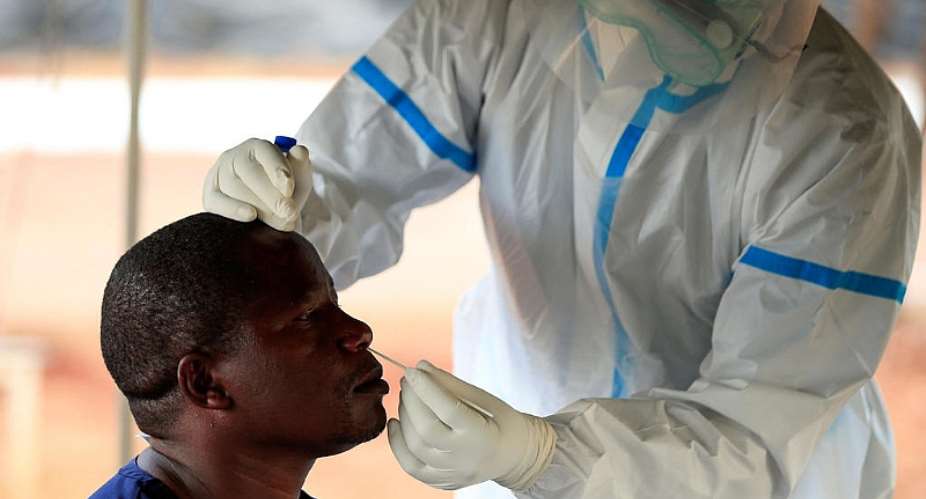China is publicly handing out money and equipment to help fight the spread of coronavirus in Zimbabwe. But Beijing's generosity has made some very wary.
Until now most in Zimbabwe have accepted that China's aid and investment strategy in the country is usually tied to infrastructure development.
The partnership announced this week between the China Gezhouba Group and a Zimbabwean company to build a new coal-fired power station worth three billion US dollars fits much better into the business mould Zimbabweans and Zimbabwe business watchers have come to expect.
Critics call the new trend, replicated in several African countries, of shipping medical supplies and offering financial support for primary health care China's “coronavirus diplomacy”.
“China has been extremely active in pushing out support to a host of countries needing assistance to tackle Covid-19,” Piers Pigou, southern Africa consultant with the International Crisis Group, tells RFI.
“It may well be expending more energy on profiling these contributions in the face of bad press relating to its responsibilities around managing and communicating around the initial stages of the pandemic.”
The suspicious list
Here are some of what's been supplied to Zimbabwe so far by the Chinese embassy and the Chinese private sector:
- An upgrade worth US$500,000 to Harare's main Covid-19 centre, the Wilkins Infectious Diseases Hospital.
- A donation of 50,000 masks, one thousand goggles and 510 protective suits by two Chinese firms to First Lady Auxillia Mnangagwa's charity
- Equipment including 166,000 face masks, 7,600 protective suits, 20,000 test kits, 12,000 pairs of gloves and five ventilators from the Chinese embassy
- Two donations from China's richest man, Jack Ma, including tens of thousands of test kits, protective suits, face masks and shields
- A US$3million donation from the China International Development Cooperation Agency to UNICEF Zimbabwe. China is also supporting the United Nations Population Fund in refurbishing neonatal clinics in southern and eastern Zimbabwe.
Shielded from criticism
Suspicion among Zimbabweans is rife. It was strongest among government critics to begin with.
Indeed, Foreign Minister Sibusiso Moyo in early April called on Zimbabweans not to blame one group of people for the origin of the coronavirus in a clear attempt to shield China from criticism.
The late Robert Mugabe used to call China Zimbabwe's “all-weather friend”, a gratitude sparked no doubt in part by China's willingness to turn a blind eye to the country's rights abuses.
But local thought leaders have resisted, using hashtags like #ChineseColony. Videos posted online showing the mistreatment of African migrant workers and traders, mostly Nigerians, in the city of Guangzhou last week haven't helped.
Attempts by Chinese diplomats in Harare to downplay the incidents only stirred anger.
“You think that Zimbabweans are so foolish that they would buy into your pathetic explanations when the whole world knows what is going on?” journalist Hopewell Chinono said in a tweeted remark to top embassy official, Zhao Baogang.
Chinono, who has more than 134,000 followers accused some Chinese firms operating in Zimbabwe of having pillaged the country and not paying taxes.
“If companies like Huawei were paying taxes, Zimbabwe would not need donations,” he said, referring to the opaque 2014 investment agreement under which the Chinese tech giant has been exempted from paying tax.
Snakes and bats
The remarks by Chinono reflect growing anti-Chinese sentiment in Zimbabwe, at least on social media. This may gain further traction, says Pigou.
“China's support is intended for all Zimbabweans, but there is a strong sense that beneficiation remains mediated by state and Zanu-PF (the ruling party) interests,” he said.
Lately even a member of Zanu-PF has let slip some frustration. In a tweet last week, Deputy Information Minister Energy Mutodi said the consumption of “dogs, cats, snakes, bats, monkeys” in China and other Asian countries had “left us all at risk of contracting the Covid-19”.
Said Mutodi: “We hope to up our game on beef exports to China, Indonesia & others soon.”





 Lay KPMG audit report on SML-GRA contract before Parliament – Isaac Adongo tells...
Lay KPMG audit report on SML-GRA contract before Parliament – Isaac Adongo tells...
 Supervisor remanded for stabbing businessman with broken bottle and screwdriver
Supervisor remanded for stabbing businessman with broken bottle and screwdriver
 NDC watching EC and NPP closely on Returning Officer recruitment — Omane Boamah
NDC watching EC and NPP closely on Returning Officer recruitment — Omane Boamah
 Your decision to contest for president again is pathetic – Annoh-Dompreh blasts ...
Your decision to contest for president again is pathetic – Annoh-Dompreh blasts ...
 Election 2024: Security agencies ready to keep peace and secure the country — IG...
Election 2024: Security agencies ready to keep peace and secure the country — IG...
 People no longer place value in public basic schools; new uniforms, painting wil...
People no longer place value in public basic schools; new uniforms, painting wil...
 'Comedian' Paul Adom Otchere needs help – Sulemana Braimah
'Comedian' Paul Adom Otchere needs help – Sulemana Braimah
 Ejisu by-election: Only 33% of voters can be swayed by inducement — Global InfoA...
Ejisu by-election: Only 33% of voters can be swayed by inducement — Global InfoA...
 Minority will expose the beneficial owners of SML, recover funds paid to company...
Minority will expose the beneficial owners of SML, recover funds paid to company...
 Prof. Opoku-Agyemang has ‘decapitated’ the NPP’s strategies; don’t take them ser...
Prof. Opoku-Agyemang has ‘decapitated’ the NPP’s strategies; don’t take them ser...
